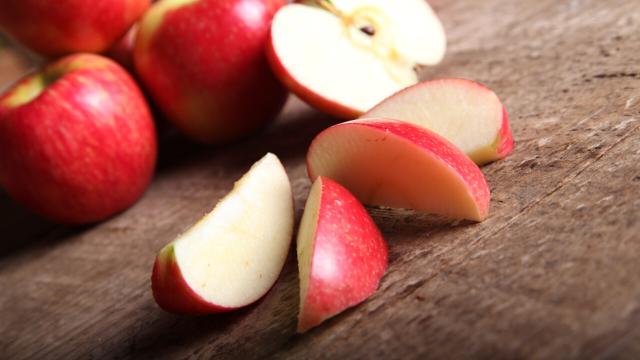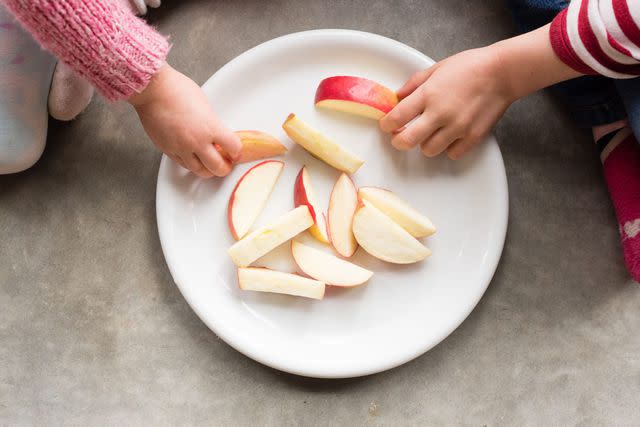The Best Way To Keep Apples From Turning Brown

The answer may surprise you.
Fact checked by Khara ScheppmannFact checked by Khara Scheppmann
You're trying to prep ahead for a big apple baking project—or perhaps you're just preparing a snack—and suddenly you realize all your beautiful apple slices have turned an off shade of murky brown. Gasp!
Apple browning is a natural reaction when the flesh of the fruit is exposed to oxygen. But you still want your apple slices to look as fresh and crisp as possible, especially for beautiful salads, or when serving them as part of a charcuterie board while entertaining. Next time, before you slice into an apple, you're going to need a way to stave off the browning process that begins the moment that the apple is exposed to air.
We have seen countless ways to prevent apple slices from browning, from dunking them in lemon-lime soda to blanching them, but we wanted to find out for ourselves which method worked best. We tested three common ways to keep apples from turning brown and were surprised to find a new favorite technique. Read on to find out which method worked the best.
Related: Here's How To Store Apples So They Stay Crisp

Why Apples Turn Brown Once Cut
When a cut apple is exposed to oxygen, the flesh will turn brown quickly in a process called oxidization. The reason this happens is because apples contain an enzyme called polyphenol oxidase. When this enzyme comes in contact with oxygen, like when an apple is sliced, it turns compounds into a brown pigment called melanin (the same pigments in people's skin).
This oxidization reaction isn't limited to just apples. It happens to other fruits, like pears, peaches, and bananas. It's also why chocolate, tea, and coffee are all brown.
Related: How To Peel Apples For Cooking And Baking
Testing Methods To Prevent Browning
There are many methods out there to slow apple slices from browning—though all apples will brown eventually. So, we tested three popular soaking methods of preventing apple oxidation to find out which one works best.
How We Tested
For each method, we mixed a liquid solution and let the apple slices soak in for one hour. Then we checked back in to see how much they had discolored. As a control, we also left slices out at room temperature by themselves to see how they fared.
Method 1: Soaking Cut Apples In Salt Water
Many say a soak in saltwater is the best way to stave off browning. For our test, we mixed 1/4 teaspoon kosher salt with 1 cup of tap water to soak our slices. (You might be wondering if this method makes the fruit salty, but testers report that it doesn't affect the flavor of the apples.)
Method 2: Soaking Cut Apples In Honey Water
Other folks say a mixture of sugar or honey and water will slow the browning process. For our test, we mixed 1 teaspoon of honey with 1 cup of tap water.
Method 3: Storing Cut Apples In Lemon Water
The old standby—a little fresh lemon juice mixed with water—is my go-to method. But is it the best For our test, we mixed 1/2 teaspoon of lemon juice with 1 cup of tap water to see if this classic method holds up.
Related: The Best Apples For Baking
Tip
If your apple slices have gone too brown or are too mealy or soft to eat, don't throw them out. These are perfect for making things like homemade applesauce or apple butter.
The Best Way To Keep Apples From Turning Brown
Turns out, soaking apple slices in salt water works the best to prevent browning!
After the time was up, the apples soaked in honey water had browned the most. They were not quite as brown as the slices left out at room temperature, but they had changed in color slightly.
The lemon water-soaked apples came in second place. They were less brown than the honey-soaked ones and still attractive enough to serve. I recommend rinsing the slices and patting them dry before eating, otherwise the lemon flavor will come through too much.
The clear winner was the salt water-soaked apple slices. The flesh remained creamy white and didn't brown at all. Like the lemon juice-soaked apples, you definitely need to rinse them and pat them dry because they will taste salty otherwise.
From now on, this is the method I will be using to preserve my cut apples.
Related: What Are The Sweetest Apples?
More Tips To Keep Your Apples From Browning
While the saltwater method works great, there are more things you can do to slow down the oxidization process and prevent all your work from going to waste. Here are a few other tricks you can try:
Cut thicker slices: If you cut thicker apple slices, then your apple will have less surface area exposed to air, which can slow the browning of the interior of the apple.
Store slices in sealed containers: The best way to prevent oxidization is to prevent exposure to oxygen. After slicing, place your apples in an air-tight container, like Tupperware or a Ziploc bag.
Keep your apples in the fridge: Apples will brown faster when they're warm. After slicing—if you aren't planning on eating them immediately, of course—pop your apples (in their sealed container!) into the fridge. They'll keep in there for three to five days.
Use an ice pack if you're on the go: If you are packing the apple slices into a lunch box for school or in a cooler for a road trip, be sure to add an ice pack to keep them cool until you're ready to eat.
Related: How To Freeze Fresh Apples
Frequently Asked Questions
Is it safe to eat apples that are browning?
Yes! While aesthetically brown apples are not the most pleasing fruits, there is no safety concern. It's simply a natural reaction to the fruit's flesh being exposed to oxygen.
Why do store-bought sliced apples not turn brown?
Store-bought apples are treated with a preservative to maintain color and freshness—often either calcium ascorbate (a blend of calcium and vitamin C) or citric acid.
How far in advance can you cut apple slices?
It is best to stick to only a few hours before you intend to use or consume them, as even our favorite method (a saltwater soak) won't keep them from browning forever. Some people will tell you to store apple slices overnight in plain water in the fridge as a make-ahead hack, but soaking apples for prolonged periods in water can dilute their flavor.
For more Southern Living news, make sure to sign up for our newsletter!
Read the original article on Southern Living.